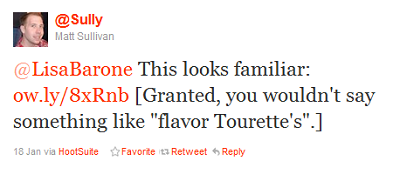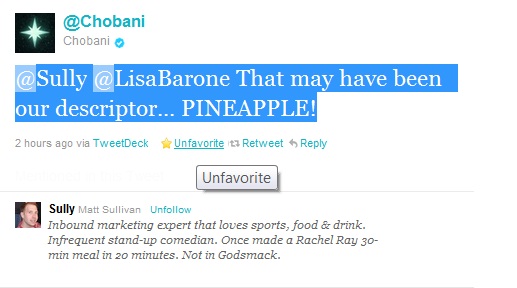It started innocently enough. My buddy Matt Sullivan read an article on Fast Company about Chobani tickling the taste of Pinterest. He thought it sounded similar to the love letter I had written earlier, so he sent it to me via Twitter knowing I might want to check it out.

The “flavor Tourettes” line is in reference to a quote found in the Fast Company article. When discussing how fanatical people are about engaging with the Chobani Facebook page, Chobani’s digital communications manager Emily Schildt is quoted as saying:
“We call it ‘flavor Turettes’ in-house,” she quips. “We get about a tweet per minute, and I would say 50% are about our newest flavor, apple cinnamon.”
No. Really. That was printed in Fast Company.
I wouldn’t call myself easily offended but I was surprised to see that when speaking on behalf of Chobani, Emily told the entire audience of Fast Company that internally the company refers to their Facebook page that way. That’s probably something you want to keep in-house. Or, you know, not do at all.
But it didn’t end there. @Chobani saw that Matt had sent me the link and decided to “engage” and “hop in the conversation”.
They did so with the following tweet:

That sound you just heard? That was Chobani falling in the 6-foot hole they had already dug for themselves.
This post isn’t meant to jump on Chobani. They made a mistake (and apologized for it) just like every company is prone to make mistakes when they enter new territories. But that’s the point, we’re all prone to these mistakes and some of us don’t all have the “forgiveableness” of an established brand like Chobani.
If you’re entering social media, you or someone on your team is going to do something stupid. I mean colossally stupid. What can you do to help avoid the mistakes instead of bulldozing right into them?
These three things.
1. Learn how to best leverage “human” for your business
We hear all the time how social media allows us to put a human face on our business, but I’d venture to say that most brands have absolutely no idea how to use that. It’s great advice for talking points or to sound really smart when you’re talking to your higher ups, but what does human business really mean for your brand? What is it going to get you?
I look at the idea of human business or social business as an opportunity to find an engaged audience by leveraging what is weird about you. To me, being human means accepting that we’re all weird and strategically letting our customers see what’s weird and authentic about us. It’s about picking what’s real, relevant, and appropriate for your audience and then serving it to them.
You probably want an example.
How about Buckley’s? If you’re not familiar with Buckley’s, it’s a Canadian cough syrup that I was first introduced to via another Fast Company article about authenticity vs perfection. In the article, Steve Jones writes about how Buckley’s has found an unlikely way to stand out in its market. Instead of trying to hide, sugarcoat or make excuses for what people have been saying about the product for years, Buckley decided to base its marketing around tackling it head-on and just admitting it.
Buckleys – It tastes awful, but it works.
That’s actually the product’s slogan. And it’s been effective. Buckley’s isn’t going after everyone who is sick, they’re going after adults who are sick and need some tough love. And, personally, I think it’s genius. They’ve found a relevant, real and appropriate way to market themselves in a crowded market. I’d venture that most cough syrups tastes pretty awful, but Buckley’s is the only one I know of that admits it, uses it, and doesn’t apologize for it. They’re not perfect and, you know what? You’re not either. Their honesty makes it easier for customers to trust the brand.
2. Create a company-wide social media policy. (And then stick to it.)
With a vision for how you’ll use social media in mind, you want to make it official and create some guidelines that employees (and even yourself) will be able to use to direct their involvement.
Matt already wrote about how companies shouldn’t make Tourette’s jokes on social media. And obviously he’s right, but these are exactly the kinds of things that happen when you attempt to “wing” social media or when you’re engaging with an unclear purpose or an undeveloped idea of what your company voice is. When you don’t take the time to iron down these details beforehand you open yourself up to employees going a little too far or making a quick that, in hindsight, maybe they should have saved for company IM instead of the company Twitter.
By writing a corporate social media policy you get the opportunity to ask and educate your staff on those important “where is the line” questions before you need to know them and put everything down on paper. In the post linked above, we went over some important questions that every business should ask when coming up with their own corporate social media plan.
For example:
- What is your purpose for being in social media?
- How does social media integrate into your employees’ existing roles?
- Who are they and what is their role?
- What sites should they be engaging on?
- What are the best practices for engagement?
- How should you handle common issues?
The best way to avoid someone driving off the road and creating a horrible, horrible accident is to teach them how to drive the car before they get in it. Not after they’ve already crashed.
Define what “being human” is NOT
Okay, so let’s be real. You never want to tell an employee they have full permission to “be weird” and “human” while speaking in the voice of your brand because they’re not going to know what that means. You also can’t tell them to “use common sense” because, well, not everyone was born with it. While you’re laying out the ground rules for what is expected of your team in social media, you may also want to explain what behing human does not mean.
For example, giving life to your brand does not mean:
- Being disrespectful.
- Being offensive.
- Being rude/difficult to deal with and calling it “authentic.”
- Being viciously snarky
- Talking to your audience like you’re both drunk at the bar.
- Sharing every thought that enters your head.
That sounds like stuff everyone on your team should already know, right? Yeah, they don’t. And you don’t want that one bit of stupidity to bring down your entire company.
Social media is helping all of us to pull back the curtain and let our customers see more of us and our brand. But that doesn’t mean letting everything hang out in the process. Have a vision, create a plan, and then put it into action. Because your customers are listening. Know what you’re telling them.

